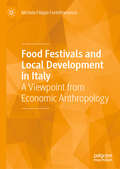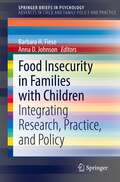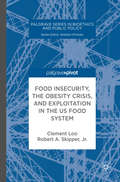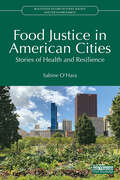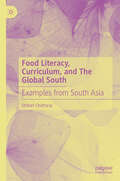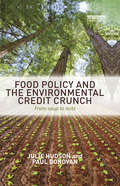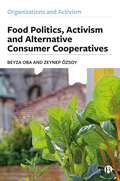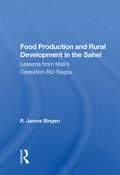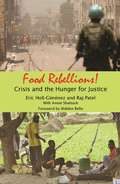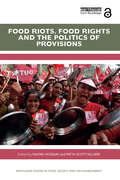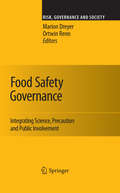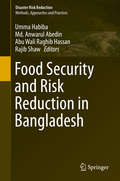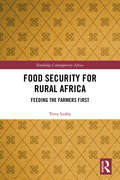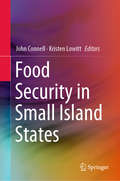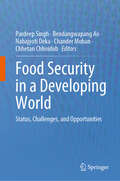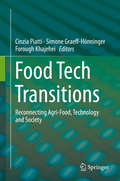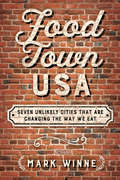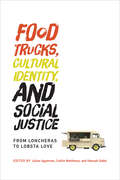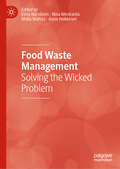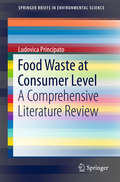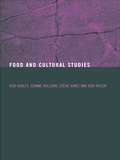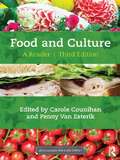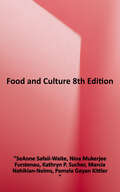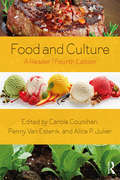- Table View
- List View
Food Festivals and Local Development in Italy: A Viewpoint from Economic Anthropology
by Michele Filippo FontefrancescoWhat does the proliferation of food festival tell us about rural areas? How can these celebrations pave the way to a better future for the local communities? This book is addressing these questions contributing to the ongoing debate about the future of rural peripheries in Europe.The volume is based on the ethnographic research conducted in Italy, a country internationally known for its food tradition and one of the European countries where the gap between rural and urban space is most pronounced. It offers an anthropological analysis of food festivals, exploring the transformational role they have to change and develop rural communities. Although the festivals aim mostly at tourism, they contribute in a wider way to the life of the rural communities, acting as devices through which a community redefines itself, reinforces its sociality, reshapes the perception and use of the surrounding environment. In so doing, thus, the books suggests to read the festivals not just as celebrations driven by food fashion, but rather fundamental grassroots instruments to contrast the effects of rural marginalization and pave the way to a possible better future for the community
Food Insecurity in Families with Children: Integrating Research, Practice, and Policy (SpringerBriefs in Psychology)
by Barbara H. Fiese Anna D. JohnsonThis book synthesizes research about the effects of food insecurity on children, families, and households, emphasizing multiple pathways and variations across developmental contexts. It focuses on emerging new methods that allow for a more refined approach to practice and policy. The volume provides a brief overview of the topic, and additional empirical chapters pose and address unanswered research questions. It concludes with a short commentary, providing recommendations for future research and policy and yielding a significant and timely contribution to advance developmental scientific knowledge and promote its use to improve the lives of children and families. Featured areas of coverage include: The effects of early food insecurity on children’s academic and socio-emotional outcomes.The effects of household food insecurity on children with disabilities.Early childhood access to Women, Infants, and. Children (WIC) and school readiness.Supplemental Nutrition Assistance Program (SNAP) and adolescent mental health. Food Insecurity in Families with Children is an essential resource for policy makers and related professionals as well as graduate students and researchers in developmental, clinical, and school psychology, child, youth and family policy, public health, and social work.
Food Insecurity, the Obesity Crisis, and Exploitation in the US Food System
by Clement Loo Robert A. Skipper Jr.This book argues that the factors contributing to obesity as a product of food insecurity have risen largely from the exploitation of vulnerable communities. In the past, food insecurity has been understood as primarily a matter of famine, hunger, and undernutrition. Such an understanding is no longer accurate: food insecurity is now also associated with obesity, the rates of which have increased dramatically in the past thirty years, particularly among lower-income communities and communities of color. This is likely the result of changes in the food system, including the reduction of access to fresh produce. Governments and intergovernmental bodies are therefore justified in more vigorously and directly intervening in the food system to ensure that communities have access to foods that contribute to better public health outcomes.
Food Justice in American Cities: Stories of Health and Resilience (Routledge Studies in Food, Society and the Environment)
by Sabine O’HaraThis book documents food insecurity in urban communities across the United States and asks whether emerging urban food and agriculture initiatives can address the food security needs of American city dwellers. While America has sufficient food to feed its entire population, 38 million people are food insecure, with urban communities and communities of color having long borne the brunt of food inequalities. This book traces the evolving story of food by describing the people behind food system statistics, focusing on cities and suburban communities across America. In doing so, it raises questions not only about food security but about a food economy that can foster justice and sustainability and combat hunger and waste. By linking human faces to the data, the book reveals the many connections between food insecurity and unsustainable practices. The book concludes by discussing some of the pathways toward a more sustainable and just food system by linking the food system to the larger economy and the many sectors that are connected to food. Because of these multifaceted connections, food can be a unique catalyst for creating pathways toward a more just and sustainable economy that is more aligned with nature. This book will be of great interest to students and scholars of food justice, food security, urban food and agriculture, urban sustainability, and sustainable food systems more broadly.
Food Literacy, Curriculum, and The Global South: Examples from South Asia
by Dishari ChattarajThis volume explores concepts and theories of food literacy to understand the interdisciplinary paradigms, perspectives, and emerging discourses in and beyond formal educational contexts in the Global South, specifically South Asia. In doing so, this volume provides a comprehensive overview of existing literature on food literacy and the methodologies utilized to study the same across the Global North and South. Furthermore, this volume reports the findings of a primary research study conducted in the domain of curriculum analysis across school education boards of six South Asian countries, including Bangladesh, Bhutan, India, Nepal, and Sri Lanka. It also documents the teaching-learning experiences and perceptions of various stakeholders from select schools and regions in India. Besides highlighting the dynamic, contextual, and place-based nature of food literacies, the volume questions the autonomous nature of literacy studies, thereby promoting a less deterministic and more sustainable, inclusive, and discursive paradigm of food literacy/literacies.
Food Policy and the Environmental Credit Crunch: From Soup to Nuts
by Paul Donovan Julie HudsonThe changing economic environment for the consumer that is emerging from the wreckage of the financial credit crunch plays directly into the importance of food spending. This is certainly true from the perspective of food prices in the short run, but also from the perspective of sustainability and reducing the impact of the environmental credit crunch. The economic changes we experience now have a bearing on our ability to manage the environmental credit crunch that looms. Food Policy and the Environmental Credit Crunch: From Soup to Nuts elaborates on the issues addressed in the authors’ first book, From Red to Green?,and asks whether the financial credit crunch could ameliorate or exacerbate the emergent environmental credit crunch. The conclusion drawn here is that a significant and positive difference could be made by changing some of the ways in which we procure, prepare, and consume our food. Written by an economist and an investment professional, this book addresses the economic and environmental implications of how we treat food. The book examines each aspect of the ‘food chain’, from agriculture, to production and processing, retail, preparation, consumption and waste.
Food Politics, Activism and Alternative Consumer Cooperatives
by Zeynep Özsoy Beyza ObaFollowing the global financial crisis of 2008, there has been significant interest among scholars and activists in alternative forms of organization that operate according to noncapitalist logic, including Alternative Consumer Cooperatives (ACCs). Using the example of Turkey, where neoliberal economics combined with authoritarian politics formed conditions that have profound social and economic consequences, this book investigates ACCs as spaces for prefigurative food politics. Offering a novel perspective on alternative forms of organizing, this book challenges the easy assumptions of what it means to be a scholar working on activism in the global north and shows how, through the foundational values of solidarity, reciprocity and responsibility, it is possible to create new and imaginative forms of politics and activism.
Food Production And Rural Development In The Sahel: Lessons From Mali's Operation Riz-segou
by R. James BingenIn Mali and throughout the Sahel, governments increasingly rely on parastatal organizations to overcome the problems of lagging food production and rural poverty. This book examines the political and economic consequences of the efforts of one organization, Operation Riz-Segou in Mali, to increase smallholder food and cash crop production. Drawing extensively on fieldwork in Mali, the author finds that significant investments in irrigation facilities, financed by foreign aid, have not reduced the smallholder's vulnerability to the risks posed by weather and uncertain flood levels of the Niger River. The extension system discourages smallholder investment for long-term agricultural development because of its preoccupation with supervision and administrative control. Moreover, the Operation engages in many popular rural development activities—literacy programs, farmer training, women's artisanal centers—that give the facade of grassroots participation but in reality do not provide villagers a critically needed voice in local program administration. Comparing Operation Riz-Segou to similar parastatal agricultural development programs in the Sahel, Dr. Bingen discusses why only those policies deliberately designed and carefully implemented to share power with the majority of the people can lay the political and economic foundation required to overcome rural poverty and resolve the food crisis in the Sahel.
Food Rebellions
by Raj Patel Eric Holt-GimenezToday there are over a billion hungry people on the planet, more than ever before in history. While the global food crisis dropped out of the news in 2008, it returned in 2011 (and is threatening us again in 2012) and remains a painful reality for the world's poor and underserved. Why, in a time of record harvests, are a record number of people going hungry? And why are a handful of corporations making record profits? In Food Rebellions! Crisis and the Hunger for Justice, authors Eric Holt-Giménez and Raj Patel with Annie Shattuck offer us the real story behind the global food crisis and document the growing trend of grassroots solutions to hunger spreading around the world.Food Rebellions! contains up to date information about the current political and economic realities of our food systems. Anchored in political economy and an historical perspective, it is a valuable academic resource for understanding the root causes of hunger, growing inequality, the industrial agri-foods complex, and political unrest. Using a multidisciplinary approach, Holt-Giménez and Patel give a detailed historical analysis of the events that led to the global food crisis and document the grassroots initiatives of social movements working to forge food sovereignty around the world. These social movements and this inspiring book compel readers to confront the crucial question: Who is hungry, why, and what can we do about it?
Food Riots, Food Rights and the Politics of Provisions (Routledge Studies in Food, Society and the Environment)
by Naomi Hossain Patta Scott-VilliersThousands of people in dozens of countries took to the streets when world food prices spiked in 2008 and 2011. What does the persistence of popular mobilization around food tell us about the politics of subsistence in an era of integrated food markets and universal human rights? This book interrogates this period of historical rupture in the global system of subsistence, getting behind the headlines and inside the politics of food for people on low incomes. The half decade of 2007–2012 was a period of intensely volatile food prices as well as unusual levels of popular mobilization, including protests and riots. Detailed case studies are included here from Bangladesh, Cameroon, India, Kenya and Mozambique. The case studies illustrate that political cultures and ways of organizing around food share much across geography and history, indicating common characteristics of the popular politics of provisions under capitalism. However, all politics are ultimately local, and it is demonstrated how the historic fallout of a subsistence crisis depends ultimately on how the actors and institutions articulate, negotiate and reassert their specific claims within the peculiarities of each policy. A key conclusion of the book is that the politics of provisions remain essential to the right to food and that they involve unruliness. In other words, food riots work. The book explains how and why they continue to do so even in the globalized food system of the 21st century. Food riots signal a state unable to meet a principal condition of its social contract, and create powerful pressure to address that most fundamental of failings..
Food Safety Governance
by Ortwin Renn Marion DreyerThis book offers a detailed analysis and a set of carefully measured suggestions towards achieving greater integration of science, precaution, and public involvement in current arrangements for European food safety governance. The devised governance framework provides a distinctive system of methodologies, participatory processes, and institutional configurations that demonstrates practical advice of how complex and conflicting food safety demands might be reconciled. At the core of the suggestions for procedural reform is a design with four governance stages (framing, assessment, evaluation, management, with participation and communication as cross-cutting activities), and an organisation into four assessment and management tracks distinguishing between risk-, precaution-, concern- and prevention-based approaches. In addition, the book suggests an innovative food safety interface structure designed to improve the politics-science-society coordination throughout the governance process.
Food Security and Risk Reduction in Bangladesh
by Rajib Shaw Umma Habiba Md. Anwarul Abedin Abu Wali Raghib HassanThis book draws examples from food security issues in Bangladesh. The book is structured around those issues and underlying causes of food security, the implications from different sectors, policy analysis, and the role and actions of various stakeholders from different sectors to ensure food security. Bangladesh is situated in a climatically vulnerable position and is impacted frequently by such climatic hazards as floods, cyclones, droughts, and salinity intrusion. Due to global atmospheric changes, abrupt shifts in climatic conditions severely affect Bangladesh's agriculture. Although Bangladesh has made significant progress in increasing domestic production of food grain, if the production of major cereals is hampered due to climate change, food security will be in jeopardy. Most estimates show that a huge amount of additional food grain will be required to feed the growing population of the country. Ensuring food security for all is the overarching goal of Bangladesh's national food policy. Therefore, ensuring food security in the future requires a great deal of additional effort in yield improvement, with limited scope for expanding the area under cultivation. The primary target readers for this book are students and researchers in the fields of environment, disaster risk reduction, and climate change studies. The book will provide them with a good idea of the current trend of research in the field and will furnish basic knowledge on this important topic. Another target group comprises practitioners and policy makers, who will be able to apply collective knowledge to policy and decision making.
Food Security for Rural Africa: Feeding the Farmers First (Routledge Contemporary Africa)
by Terry LeahyAt least fifty years of projects aimed at the rural poor in Africa have had very little impact. Up to half of the children of these countries are still suffering from stunting and malnutrition. Soil degradation and poor crop yields are ubiquitous. Projects are almost always aimed at helping local people to solve their problems by growing for the market. In some countries, projects link poor villagers into cooperatives to produce a commercial output. In other countries, projects target more competent entrepreneurial villagers. Almost all these projects fail after several years. Even those that are successful make few inroads into the problems. While the slogan 'feeding the farmers first' comes from the Philippines, it is particularly applicable to much of Africa, where household food security can come from household production. This book explains how projects can be designed that increase food security through subsistence production. Focusing on particular people and projects, it gives a sociological analysis of why this is so difficult to manage. This book challenges the models promoted by academics in the field of development studies and argues against the strategies adopted by most donor organizations and government bodies.It explains why commercial projects have been so ubiquitous even though they rarely work. It gives practical tips on how to set up villages and farms to achieve sustainable solutions that also provide plenty of nutritious food. The book is written to be accessible and engaging. For anyone planning to work in the rural areas of Africa, this book is required reading.
Food Security in Small Island States
by John Connell Kristen LowittThis book provides a contemporary overview of the social-ecological and economic vulnerabilities that produce food and nutrition insecurity in various small island contexts, including both high islands and atolls, from the Pacific to the Caribbean. It examines the historical and contemporary circumstances that have accompanied the shift from subsistence production to the consumption of imported, processed foods and drinks, and the impact of this transition on nutrition and the rise of non-communicable diseases. It also assesses the challenges involved in reversing this trend, and how more effective social and economic policies, agricultural and fisheries strategies, and governance arrangements could promote more resilient and sustainable small island food systems. It offers both theoretical and practical perspectives, and brings together a broad range of policy areas, e.g. agriculture, food, commerce, health, planning and socio-economic policy.Given its scope, the book offers a valuable resource for a range of disciplines in a number of regional contexts, and for the growing number of scholars and practitioners working on and in small island states. It will be of particular value as the first book to examine the diversity and commonalities of island states around the globe as they confront issues of food security.
Food Security in a Developing World: Status, Challenges, and Opportunities
by Pardeep Singh Bendangwapang Ao Nabajyoti Deka Chander Mohan Chhetan ChhoidubThe book tries to answer the most fundamental question of whether there is a link between abundant food supply and economic growth with respect to a higher degree of human development. In order to have flourishing economic growth within a country the need for a food security system is a must. The world as we know is faced with shortages of food supply which has been a major factor in the country's economic development. The book is an attempt to understand the problems and current situation of food systems in the developing world. It focuses on the pathways to understand the challenges that it faces and predict future scenarios. The motive is to create academic literature to understand the basis of sustainable food security. The social, economic, and political factors become the main theme of the book. It focuses on the interdisciplinary nature of food security. Many a time we only understand the idea of food security through the lens of scientific nature but in the meantime, it forgets the other important factors that are governing the issue of food security. The inclusion of the cases section in the book helps to outline the current scenarios of the developing world. It helps to formulate a pathway or a way forward to understand the causes of food security. Food has now become a political context in the international system. The need for analyzing the political angle is necessary. The context of innovations and technological developments forms an important part of food security. The critique of existing policy systems across the developing world is a must need discussion as it is the policies that will make the food systems sustainable. Last but not least is to look at how the global food systems work and how far it has been able to fix the problems of food insecurity in the developing world. Overall, the book is an excellent interdisciplinary food security literature.
Food Stamps and Income Maintenance
by Maurice MacdonaldThis monograph evaluates effects of the Food Stamp program on recipient well-being and related benefits for taxpayers and the food industry.
Food Tech Transitions: Reconnecting Agri-Food, Technology and Society
by Cinzia Piatti Simone Graeff-Hönninger Forough KhajeheiThe food industry is now entering a transition age, as scientific advancements and technological innovations restructure what people eat and how people think about food. Food Tech Transitions provides a critical analysis of food technology and its impact, including the disruption potential of production and consumption logic, nutrition patterns, agronomic practices, and the human, environmental and animal ethics that are associated with technological change.This book is designed to integrate knowledge about food technology within the social sciences and a wider social perspective. Starting with an overview of the technological and ecological changes currently shaping the food industry and society at large, authors tackle recent advancements in food processing, preserving, distributing and meal creation through the lens of wider social issues.Section 1 provides an overview of the changes in the industry and its (often uneven) advancements, as well as related social, ecological and political issues. Section 2 addresses the more subtle sociological questions around production and consumption through case-studies. Section 3 embraces a more agronomic and wider agricultural perspective, questioning the suitability and adaptation of existing plants and resources for novel food technologies. Section 4 investigates nutrition-related issues stemming from altered dietary patterns. Finally, Section 5 addresses ethical questions related to food technology and the sustainability imperative in its tripartite form (social, environmental and economic).The editors have designed the book as an interdisciplinary tool for academics and policymakers working in the food sciences and agronomy, as well as other related disciplines.
Food Town, USA: Seven Unlikely Cities That are Changing the Way We Eat
by Mark WinneLook at any list of America's top foodie cities and you probably won't find Boise, Idaho or Sitka, Alaska. Yet they are the new face of the food movement. Healthy, sustainable fare is changing communities across this country, revitalizing towns that have been ravaged by disappearing industries and decades of inequity.What sparked this revolution? To find out, Mark Winne traveled to seven cities not usually considered revolutionary. He broke bread with brew masters and city council members, farmers and philanthropists, toured start-up incubators and homeless shelters. What he discovered was remarkable, even inspiring.In Bethlehem, Pennsylvania, once a company steel town, investment in the arts has created a robust new market for local restaurateurs. In Alexandria, Louisiana, "one-stop shopping” food banks help clients apply for health insurance along with SNAP benefits. In Jacksonville, Florida, aeroponics are bringing fresh produce to a food desert.Over the course of his travels, Winne experienced the power of individuals to transform food and the power of food to transform communities. The cities of Food Town, USA remind us that innovation is ripening all across the country, especially in the most unlikely places.
Food Trucks, Cultural Identity, and Social Justice: From Loncheras to Lobsta Love (Food, Health, and the Environment)
by Julian Agyeman Caitlin Matthews Hannah SobelAspects of the urban food truck phenomenon, including community economic development, regulatory issues, and clashes between ethnic authenticity and local sustainability.The food truck on the corner could be a brightly painted old-style lonchera offering tacos or an upscale mobile vendor serving lobster rolls. Customers range from gastro-tourists to construction workers, all eager for food that is delicious, authentic, and relatively inexpensive. Although some cities that host food trucks encourage their proliferation, others throw up regulatory roadblocks. This book examines the food truck phenomenon in North American cities from Los Angeles to Montreal, taking a novel perspective: social justice. It considers the motivating factors behind a city's promotion or restriction of mobile food vending, and how these motivations might connect to or impede broad goals of social justice. The contributors investigate the discriminatory implementation of rules, with gentrified hipsters often receiving preferential treatment over traditional immigrants; food trucks as part of community economic development; and food trucks' role in cultural identity formation. They describe, among other things, mobile food vending in Portland, Oregon, where relaxed permitting encourages street food; the criminalization of food trucks by Los Angeles and New York City health codes; food as cultural currency in Montreal; social and spatial bifurcation of food trucks in Chicago and Durham, North Carolina; and food trucks as a part of Vancouver, Canada's, self-branding as the “Greenest City.”ContributorsJulian Agyeman, Sean Basinski, Jennifer Clark, Ana Croegaert, Kathleen Dunn, Renia Ehrenfeucht, Emma French, Matthew Gebhardt, Phoebe Godfrey, Amy Hanser, Robert Lemon, Nina Martin, Caitlin Matthews, Nathan McClintock, Alfonso Morales, Alan Nash, Katherine Alexandra Newman, Lenore Lauri Newman, Alex Novie, Matthew Shapiro, Hannah Sobel, Mark Vallianatos, Ginette Wessel, Edward Whittall, Mackenzie Wood
Food Waste Management: Solving the Wicked Problem
by Elina Närvänen Nina Mesiranta Malla Mattila Anna HeikkinenThis book focuses on the crucial sustainability challenge of reducing food waste at the level of consumer-society. Providing an in-depth, research-based overview of the multifaceted problem, it considers environmental, economic, social and ethical factors. Perspectives included in the book address households, consumers, and organizations, and their role in reducing food waste. Rather than focusing upon the reasons for food waste itself, the chapters develop research-based solutions for the problem, providing a much-needed solution-orientated approach that takes multiple perspectives into account.Chapters 1, 2, 12 and 16 of this book are available open access under a CC BY 4.0 license at link.springer.com
Food Waste at Consumer Level: A Comprehensive Literature Review (SpringerBriefs in Environmental Science)
by Ludovica PrincipatoThis book presents what is the state-of-the-art in the field of the food waste phenomenon at consumer level, including a thorough literature review, and it highlights trends in the field. It provides a comprehensive starting point for future research. Food waste represents a major public policy issue, which is included in the UN Sustainable Development Goals. In this context, the present work identifies the most important definitions given to food waste and its environmental, social and economic impacts. With a comprehensive literature review that covers a forty-year time span (1977-2017), this book highlights the multiple, complex facets of food waste at the consumer level. Drawing from behavioural and marketing theories, it proposes a new theoretical framework with the aim to better explain food waste behaviour. Extensive research is being carried out on the main worldwide initiatives (both public and private) and food policies aimed at tackling the phenomenon.
Food and Cultural Studies (Studies in Consumption and Markets)
by Steve Jones Ben Taylor Joanne Hollows Bob AshleyWhat and how we eat are two of the most persistent choices we face in everyday life. Whatever we decide on though, and however mundane our decisions may seem, they will be inscribed with information both about ourselves and about our positions in the world around us. Yet, food has only recently become a significant and coherent area of inquiry for cultural studies and the social sciences.Food and Cultural Studies re-examines the interdisciplinary history of food studies from a cultural studies framework, from the semiotics of Barthes and the anthropology of Levi-Strauss to Elias' historical analysis and Bourdieu's work on the relationship between food, consumption and cultural identity. The authors then go on to explore subjects as diverse as food and nation, the gendering of eating in, the phenomenon of TV chefs, the ethics of vegetarianism and food, risk and moral panics.
Food and Culture, 3rd Edition
by Carole Counihan Penny Van EsterikThe classic book that helped to define and legitimize the field of food and culture studies is now available, with major revisions, in a specially affordable e-book version (978-0-203-07975-1). The third edition includes 40 original essays and reprints of previously published classics under 5 Sections: FOUNDATIONS, HEGEMONY AND DIFFERENCE, CONSUMPTION AND EMBODIMENT, FOOD AND GLOBALIZATION, and CHALLENGING, CONTESTING, AND TRANSFORMING THE FOOD SYSTEM. 17 of the 40 articles included are either, new to this edition, rewritten by their original authors, or edited by Counihan and van Esterik. A bank of test items applicable to each article in the book is available to instructors interested in selecting this edition for course use. Simply send an e.mail to the publisher at companionaccess@informa.com.
Food and Culture, 8e
by Nina Mukerjee Furstenau SeAnne Safaii-Waite Kathryn P. Sucher Marcia Nahikian-Nelms Pamela Goyan KittlerProviding current information on the health, culture, food, and nutrition habits of the most common ethnic and racial groups living in the United States, Food and Culture supports human diversity and inclusivity and provides you with an accessible lens to see the connection. This market-leading text for cultural foods courses is also designed to help health professionals, chefs, and others in the food service industry learn to work effectively with members of different ethnic and religious groups in a culturally sensitive manner. It also will help you develop a grounded perspective of the diversity in the United States and enhance effective communication across cultures in any field of work. The authors include comprehensive coverage of key ethnic, religious and regional groups, including Native Americans, Europeans, Africans, Black Americans, Mexicans and Central Americans, Caribbean Islanders, South Americans, Chinese, Japanese, Koreans, Southeast Asians, Pacific Islanders, people of the Balkans, Middle Easterners, Asian Indians, and regional Americans.
Food and Culture: A Reader (Food In History And Culture Ser. #Vol. 1.)
by Carole Counihan Penny Van Esterik Alice JulierThis innovative and global best-seller helped establish food studies courses throughout the social sciences and humanities when it was first published in 1997. The fourth edition of Food and Culture contains favorite articles from earlier editions and several new pieces on food politics, globalism, agriculture, and race and gender identity.
